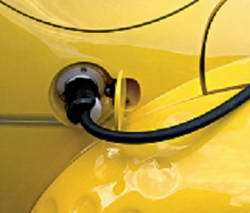Future cars could be fuelled by hydrogen technology

A small CSIRO-developed hydrogen device the size of a domestic microwave oven may be all you need to fuel your car in the future.
A team at CSIRO Manufacturing and Infrastructure Technology has developed a small device that can extract enough hydrogen per day from water to power a family car for up to150kms.
This work is an important part of CSIRO's Energy Transformed Flagship research program into positioning Australia for a future hydrogen economy.
Currently, the hydrogen unit runs on main's power, but researchers are investigating how to power the unit with renewable energy, such as solar and wind power.
While the idea of fuelling your car with hydrogen generated from a solar panel might sound like science fiction, project leader Dr Sukhvinder Badwal says concepts such as the hydrogen economy are real possibilities.
"Every time we stop at the petrol station to fill up the car we are reminded that fuel prices are not getting any lower," Dr Badwal says.
At this stage, hydrogen cannot compete with fossil fuels, but rising oil prices could create a different scenario, Dr Badwal says. "We just need to look towards future oil import costs."
He says that hydrogen is the cleanest fuel nature has given us and its portability and flexibility makes it ideal for a range of applications, including transport.
"While Australia has abundant renewable energy sources, such as solar and wind power, they cannot directly provide the portable fuel required by the transport sector. Hydrogen can fulfil that demand but, because it is not a naturally occurring fuel, has to be generated using conventional fuels or renewable sources."
Dr Badwal says that although several commercial systems exist, they are not very efficient. High capital costs, lifetime performance and the inability to handle intermittent and varying loads – important qualities when dealing with renewable energy sources – are also current drawbacks.
This is where CSIRO's latest work could make the difference. It is developing a solid-state system based on polymer electrolyte membranes for on-demand, distributed hydrogen production at homes, small-to-medium enterprises, remote locations, service stations and other end-user sites, where water and electricity are available.
The hydrogen generated can be stored for long periods and be converted to electricity when needed. The ability to generate energy on-site and on-demand would reduce up-front infrastructure costs. Dr Badwal says the team is still in the research and development stage, but "would like to have a commercial partner on board, as full-scale commercialisation is three to four years away".
Source: CSIRO

















